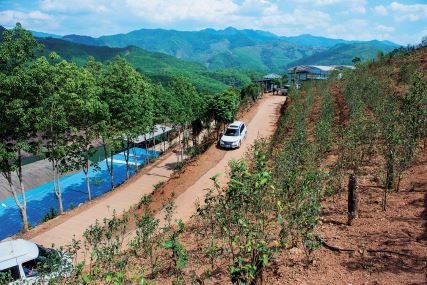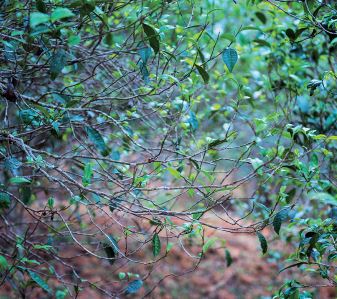Some describe the ancient Tea gardens of Xigui with the phrase, “head crowned by snow-capped mountains, feet planted on the Lancang River,” imbued with a touch of heroic spirit, which, upon reflection, accurately captures the essence of Xigui.
This ancient tea garden, occupying a prime location on the mountain, is the closest and lowest altitude ancient tea garden among the famous peaks, beloved for its robustness tempered with gentleness.
Gali Ferry
Many who visit Xigui are captivated not only by the enchanting scenery of the Manglu Mountain tea gardens but also by the majestic and picturesque views of the Lancang River.
However, they often overlook the turbulent stretch of the Lancang River at the foot of Manglu Mountain, which was once the Gali Ferry, a crucial crossing point on the Lancang River playing a significant role in the history of the Tea Horse Road.
In the eighteenth year of the Ming Hongwu period (1385), Si Lunfa, the leader of Luchuan (a Dai regime located in present-day western Yunnan and northern Myanmar), led his troops to attack Zheji Village, which had already been incorporated into the territory of the Ming Dynasty's Jingdong Prefecture, thereby opening a passage from Lincang to Jingdong and other areas.
With the prosperity of the Tea Horse Road, the Gali Ferry appeared no later than the Ming Dynasty, as recorded in the “Yunnan Gazetteer” compiled by Zou Yinglong in the sixth year of the Longqing period of the Ming Dynasty (1572) as a ferry on the Lancang River, and in Xu Xiake's Travel Notes (September 9, 1639) as the “Jiali Lancang River Ferry.”
At that time, one ancient road from Minning (present-day Linxiang District) to Jingdong passed through Bingtuo, Wutaislopo, Zhangzhen, Bangbao, and reached Old Bangdong Street. Another route started from Yunzhou (present-day Yun County), passing through Mengma (present-day Dazhai, Yun County), Dashishi (present-day Dazhaixi Town, Yun County), and reached Old Bangdong Street. After converging at Old Bangdong Street, travelers crossed the Lancang River to Jingdong, with the Gali Ferry being an essential part of this journey.
The “Minxian Gazetteer” compiled by Qiu Tinghe in 1948 records: “The ‘Lancang River Ferry' mentioned in the ‘Yunnan Gazetteer' is the Gali Ferry in our county. It is 140 li east of the city and a vital passage to Jingdong, with boats set up for ferrying.”

During the Qing Dynasty, due to its strategic location, the Gali Ferry had grown in scale, with boats for ferrying and lodging for merchants and horse caravans. During the Guangxu and Xuantong periods, merchants from various regions established trading houses here, primarily engaged in waterborne transport of salt and tea.
In the Republican era, locals such as Yang Laiqian and Qiu Yuelou established Changxing Company at the ferry, while Qiu Qishan and Song Yusan established Tongqing Company, and Su Sanbao from Jingdong established Yunfeng Company, and Wang Yigui established Yixing Company, all operating waterborne transport mainly involving salt and tea at the Gali Ferry.
In 1986, the Gali Ferry was renamed Xigui Ferry. In 2009, the newly constructed Xiushan Dock on the Zhenyuan County side replaced the Xigui Ferry. By the end of 2025, the Mojiang-Lincang Expressway opened, with the Lancang River Bridge towering above the old ferry.
Characteristics of Flavor
The unique geographical and natural environment makes the low-altitude Manglu Mountain a paradise for tea trees, endowing Xigui tea with strong, rich fragrance, and a lingering aftertaste. Throughout the entire Xigui production area, most tea trees grow on slopes strewn with boulders and sandy soil, a type of “sheep liver stone” geology, which allows the roots to develop well.
A key substance in tea leaves is amino acids, where the higher the content, the fresher and more refreshing the tea will be. Theanine, an amino acid, is synthesized in the root tips of the tea plant, so for tea to be more refreshing, it must have a well-developed root system.

Xigui tea is a late-maturing variety, with water-soluble extracts reaching 48.2%, comparable to Bingdao tea. For example, the Spring Tea's first and second leaves contain 2.8% amino acids, 28.3% polyphenols, 18.5% catechins, and 4.4% Caffeine.
Previously, some compared Xigui to “Lincang's Banzhang,” a comparison based not just on reputation but also on certain similarities. Xigui tea is renowned for its “intense aroma, clear sweetness, heavy flavor, and throat moistening,” overall combining strength and gentleness, with both restrained yet potent qi and a subtle sweetness.
Based on the comprehensive sample of the 2025 Xigui ancient tree spring tea produced by Li Jiang Qiuyuetang, we present the tasting notes for the ancient tree tea of Manglu Mountain as follows:

Dry Leaves: The appearance of Xigui tea can be simply described as “dark thin strips, unappealing stems.” The ancient tree tea of Xigui has dark, lustrous strips, with tender stems of a dark red color, generally long and dark, and mostly devoid of downy hairs. Additionally, due to the nature of the vine tea, the stems are longer and often resemble horseshoes.
Infusion Color: The tea liquor is pale yellow and bright.
Aroma: The floral fragrance is rich and high-pitched, with a sweet undertone. This distinctive aroma has a strong regional character and is difficult to replicate through blending.
Taste: The initial infusions are full-bodied and robust, with a slight bitterness that dissipates quickly. Orchid fragrance is evident in the tea liquor, accompanied by a fine texture and a strong aftertaste and saliva stimulation, demonstrating a blend of robustness and gentleness.
In subsequent infusions, the orchid fragrance becomes more pronounced, with a sweet and fragrant sensation akin to rock Sugar, leaving a lasting aroma in the mouth.
Aftertaste: The throat sensation is deep and the aftertaste lasts long.
Leaves: Overall greenish-yellow in color, the leaves are plump and strong.
(Acknowledgments: The tea samples for this tasting were kindly provided by Li Jiang Qiuyuetang Tea Industry Co., Ltd.)
Excerpted from Pu'er Magazine
July 2025 Issue
“The Sturdy Yet Gentle Xigui”
Contact us to remove if there is any infringement.